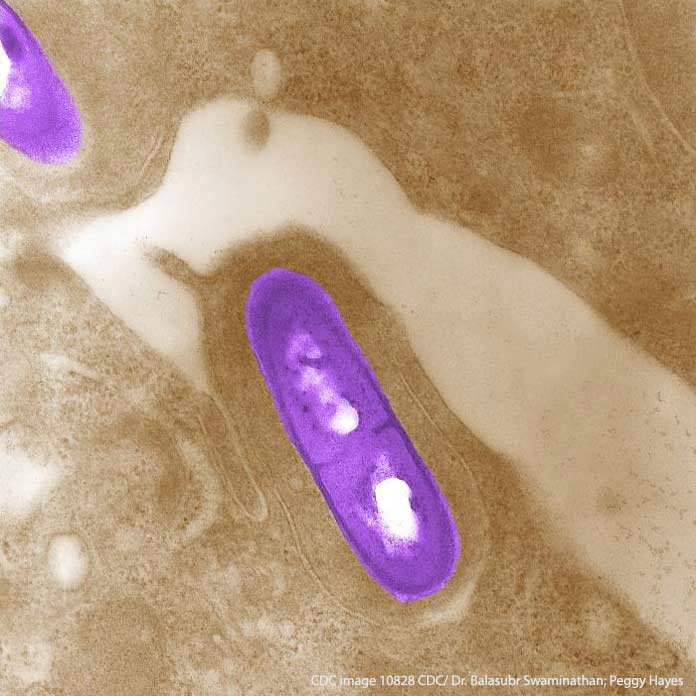Doctors have long known that listeriosis in a pregnant woman, especially toward the end of pregnancy, can cause miscarriage, stillbirth, premature labor, and serious illness in a newborn baby, including meningitis (brain infection). These problems are so serious that pregnant women who may have been exposed to Listeria monocytogenes bacteria are often given prophylactic doses of antibiotics to forestall an infection. Now, a new study conducted at the University of Wisconsin-Madison has shown that listeriosis is also a serious miscarriage threat in early pregnancy.
Dr. Ted Golos, a UW-Madison reproductive physiologist and professor of comparative biosciences and obstetrics and gynecology said:
“For many years, Listeria has been associated with adverse outcomes in pregnancy, but particularly at the end of pregnancy. What wasn’t known with much clarity before this study is that it appears it’s a severe risk factor in early pregnancy.”
In fact, listeriosis may be the cause of early miscarriages that do not have a diagnosed cause. Pregnant women usually only have very mild flu-like symptoms when they contract this illness, and sometimes the symptoms are indistinguishable from those of pregnancy itself.
The Research
The research was conducted by Bryce Wolfe, a UW-Madison graduate student studying cellular and molecular pathology. She took Listeria bacteria provided by Sophia Katharine, a North Carolina State University Professor of food science and microbiology, and gave the pathogens to four pregnant rhesus macaques monkeys at the Wisconsin National Primate Research Center. That particular Listeria staring had caused stillbirth, miscarriage, and premature delivery in at least 11 pregnant women in 2000. Scientists measured the speed and progression of the Listeria’s spread.
None of the monkeys showed any obvious signs of infection or illness before they miscarried. Tissue samples taken after the miscarriages revealed that Listeria had invaded the placenta and the endometrium (the lining of the uterus). The placenta acts as a barrier against toxins and bacteria. Inflammation caused by the maternal immune response to the Listeria monocytogenes bacteria apparently damaged the placenta, letting the bacteria in to kill the fetus.
Dr. Charles Czuprynski, a UW-Madison professor of pathobiological sciences and director of the UW-Madison Food Research Institute said, “what’s particularly striking about the work Bryce did is the detailed information we now have about the organism. The animal ingested it; she tracked it being shed in feces and showing up in the bloodstream. They did an ultrasound analysis of the fetus, and could then show events in terms of where the organism was preceding fetal demise.”
Listeriosis in the United States
About 1,600 Americans are sickened with listeriosis every year. This is a small number, but the illness has serious consequences. Newborn babies and older adults with weak immune systems are often seriously sickened or killed by these pathogenic bacteria.
Pregnant women are told to avoid many foods that can carry a risk of Listeria monocytogenes contamination. They include unpasteurized milk and cider, raw sprouts, soft cheeses, deli meats, and melons. there is a zero-tolerance policy in place for this bacteria in ready to eat foods for exactly this reason.
Golos continued, “it’s striking that mom doesn’t get particularly ill from listeria infection, but it has a profound impact on the fetus. That’s familiar now because we’ve been talking about the same difference in Zika virus.”
Effective antibiotics are available to prevent these tragedies. But the difficulty is knowing that the mother has been exposed to Listeria bacteria. The fetus may be infected before the mother even realizes she is sick.
Listeria Lawsuits
Our law firm has filed lawsuits against firms that have produced and sold contaminated food. One such lawsuit was filed in early 2015 on behalf of an infant who was born prematurely and diagnosed with listeriosis after his mother had eaten a Bidart Brothers’ caramel apple tainted with the pathogenic bacteria. The baby was hospitalized for four weeks and was still sick two months after he was born.
A parent can also file a lawsuit on behalf of a child sickened with Listeria monocytogenes food poisoning. The bacteria can cause meningitis in children that can cause permanent damage or wrongful death.
